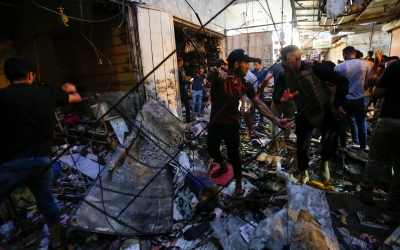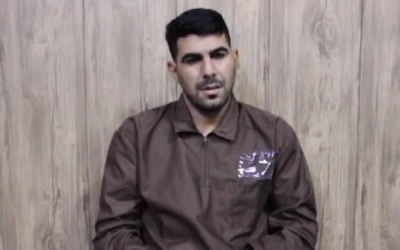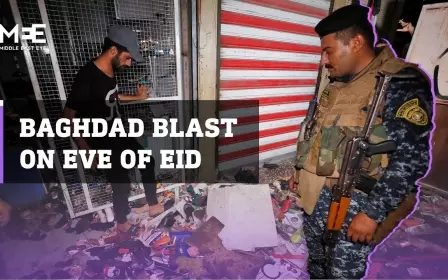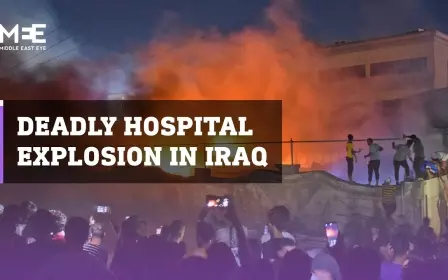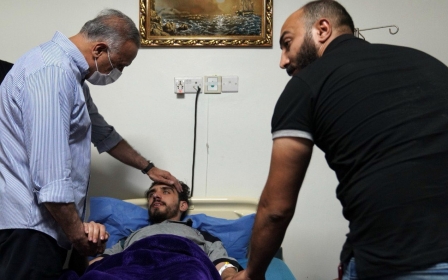Iraq still needs US help against Islamic State group, says foreign minister
Iraq's war against the Islamic State (IS) group is not over, and Baghdad still needs Washington's help in its fighting, Iraqi Foreign Minister Fuad Hussein said on Friday during an official visit to the United States.
Speaking at a joint press conference alongside his American counterpart, Antony Blinken, Hussein lavished praise on US-Iraqi relations and called for maintaining security cooperation between the two countries.
"ISIS operations are still ongoing in Iraq," Hussein said using another acronym for IS. "ISIS's activity is a threat to the Iraqi community, the regional community and the international community."
He cited, in particular, the recent suicide bombing in Baghdad's Sadr City, which killed dozens of Iraqis. The Iraqi foreign minister added that, because IS espouses a transnational ideology, global work is required to counter it.
"We need to work with the International Coalition, led by the United States, against the terrorists of ISIS," Hussein said.
New MEE newsletter: Jerusalem Dispatch
Sign up to get the latest insights and analysis on Israel-Palestine, alongside Turkey Unpacked and other MEE newsletters
Hussein's remarks came as several US media outlets reported that Washington was set to withdraw its combat troops from Iraq and shift into an entirely advisory role in assisting Iraqi forces.
The Wall Street Journal first revealed the planned announcement of the troop withdrawal on Thursday. Despite his call for American help in the fight against IS, Hussein had told the newspaper that Iraq does not need US combat soldiers.
"We need cooperation in the field of intelligence. We need help with training. We need troops to help us in the air," he said.
With the help of the US-led coalition and, separately, the Iran-backed Popular Mobilisation Units (PMUs), Iraq has recovered large areas of land from IS, which had captured Mosul and more than a third of the country's territory in 2014.
Despite its territorial defeat, IS remains active in Iraq through guerrilla warfare and attacks on civilian targets.
On Friday, Blinken said US-Iraqi ties went beyond the fight against IS, highlighting Washington's humanitarian assistance to Iraq. He also voiced support for the country's upcoming parliamentary elections.
"The United States is proud to be leading international efforts to support Iraq's elections in October, free and fair elections, so the Iraqi people can have their voices heard and choose their leaders," he said.
The State Department announced $155m in additional humanitarian aid to Iraq and Iraqi refugees later on Friday.
US forces in Iraq have been coming under frequent attacks, including rocket fire, from Iran-linked groups.
Last month, the US military bombed the positions of Iran-backed Iraqi fighters on both sides of the Iraq-Syrian border in response to rocket assaults on bases that host US troops, as well as an attack in the vicinity of Washington's embassy in Baghdad.
'Strategic partnership'
Early in 2020, tensions almost turned into an all-out war when then-president Donald Trump ordered the killing of top Iranian general Qasem Soleimani near the airport in Baghdad.
At the time, the Iraqi parliament passed a law calling for the expulsion of US troops from the country.
The US and Iraq will announce the combat troop withdrawal next week during a visit by Prime Minister Mustafa al-Kadhimi to Washington, Politico and the WSJ reported.
The United States invaded Iraq in 2003, toppling longtime autocrat Saddam Hussein and dissolving the country's security forces, sparking an era of sectarian violence that saw the rise of militant groups such as IS.
American combat troops left the country in 2011 in an agreement with the Iraqi government - only to return in smaller numbers as part of the anti-IS coalition.
Last week, Kadhimi told Washington Post columnist David Ignatius that Iraq was seeking a "strategic partnership," including military cooperation, with the United States.
But the Iraqi premier expressed support for the withdrawal of US combat troops.
"We are no longer in need of US combat troops," he said. "At the same time, we will continue to need intelligence support, training, capacity building and advice."
Middle East Eye delivers independent and unrivalled coverage and analysis of the Middle East, North Africa and beyond. To learn more about republishing this content and the associated fees, please fill out this form. More about MEE can be found here.


